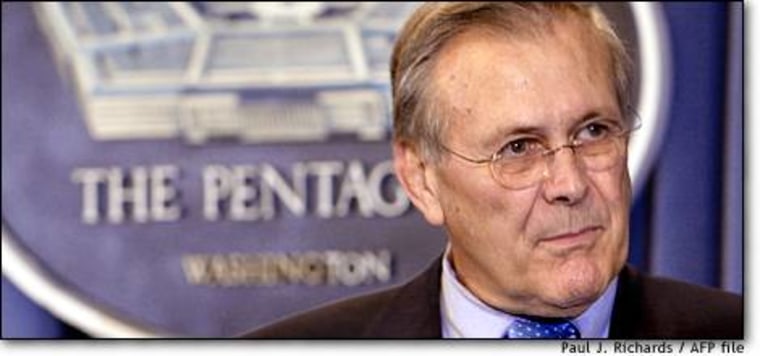The most important story of the year so far — at least if you care about preventing another Sept. 11-style event — came and went rather quietly in Saturday’s editions of The New York Times. Secretary of Defense Donald Rumsfeld has won a major turf battle, confounding efforts to bring intelligence agencies under a single, logical command. His defense budget and fiefdom is preserved, but the nation’s defense is a different issue.
Thanks to an old Washington trick — leaking information late on Friday to make sure it appears in the least-read edition of the week — news of Rumsfeld’s victory over CIA Director George Tenet, the man most likely to be ordained “czar” of the sprawling American intelligence community, went largely unnoticed.
The Times story quotes senior defense officials as saying that Rumsfeld is about to create a new post in the Pentagon, an undersecretary of defense for intelligence, who will take control of the vast array of intelligence-gathering agencies under the DOD’s wing. The man said to be his choice, Richard L. Haver, is a former naval intelligence officer and aide to Vice President Dick Cheney. Haver denies the report with just the right degree of humility. But The Times reports that Congress appears to support the idea.
CHECK ON Tenet
In itself, this move is long overdue. The problems of coordination and overlap that bedevil the larger intelligence community are duplicated on a slightly smaller scale inside the Pentagon, where no single official except the Secretary of Defense exercised control over the vast eavesdropping capabilities of the National Security Agency, the assessments of the Defense Intelligence Agency and the satellite photographs of the National Imagery and Mapping Agency (just to name a few).
But Rumsfeld’s move, viewed against the larger effort to fix what is wrong with American intelligence-gathering generally, would be a major setback to those who want to bring accountability and coordination across the spectrum of intelligence-gathering. The Pentagon’s new intelligence fiefdom would effectively section off (or, in Washington-think, protect the budget of) all the DOD’s agencies from outside interference — a playground that amounts to over 50 percent of all U.S. intelligence assets.
HALF MEASURES
Already, the Bush administration’s plans for “reform” in intelligence have been derided by critics in both parties as little more than moving furniture around the same building. Instead of rationalizing intelligence under a single person (who would thus be accountable for failures, for instance), the current plan merely creates yet another fiefdom. Worse still, the fiefdom has no analytical power or intelligence capabilities of its own. It merely collates the material flowing from the already flawed system.
(A quick look at the Congress’ 2002 intelligence authorizations bill gives a good idea of the argument for rationalizing all of this.)
As we learned in a series of revelations last winter, the current hodgepodge of agencies, along with the FBI, State Department and CIA and various semiautonomous fiefdoms, often had pieces of the Sept. 11 puzzle. Just as often, these agencies were surprised after the attacks to find that their data, had it been shared and commingled with intelligence from rival agencies, might have saved thousands of American lives.
Sen. Fred Thompson, a straight-talking Republican member of the intelligence committee who is quitting his job this year, said he was “deeply concerned” at the lack of teeth in the proposed reforms.
Thompson sees what is going on, and wants a single official put in charge of foreign intelligence, and another in charge of domestic intelligence — a model drawn from Britain’s MI-5 and MI-6.
Instead, as one Senate intelligence staffer told me: “They just want to move the furniture around inside these agencies. There’s no hard questions being asked, and so no fall guy for what happened.”
DO THE RIGHT THING
Imagine if, instead, the Bush administration took the tough approach of the New York City Fire Department: hiring an independent, outside consultant to study what went wrong.
That decision has led to a scathing report on an agency which, heroic though it is, also acknowledges some terrible mistakes on Sept. 11. People who died trying to save lives will be criticized for poor judgment. People who didn’t die and may be tremendously haunted by the loss of relatives and colleagues and friends will have to face further anguish as their own failings are detailed.
The FDNY knows what Washington apparently can’t face: the dead are dead, and the only way to honor them properly is to do everything possible to ensure it never happens the same way again.
Asking Washington careerists and politicians to be as brave as the FDNY is probably futile. Clearly, it is easier to just paper over the mistakes and hide behind a veil of secrecy. But my bet is that New York’s bravest will learn a great deal more about dealing with disasters like Sept. 11 than our national government learns about preventing them. And that is a national tragedy.
Mail your thoughts to Michael Moran, request to join (or be removed from) his email notification list.
